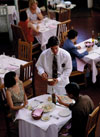

In today's uncertain global climate, the hospitality industry is faced with the somewhat daunting challenge of securing their most valuable business asset, people.
Indeed, when doing a random Google search, the articles all proclaim that more should be done to secure patrons, providing them with a safe haven that is both relaxing and secure.
In South Africa the challenge is no less. "The hospitality industry revolves around people and, more importantly, the clientele. Securing them is vital as it not only impacts their wellbeing but also the establishments' reputation and ultimately the bottom line," comments Neil Cameron, systems divisional manager at Johnson Controls Systems and Service South Africa.
"An establishment secures unknown assets, such as valuables that customers carry. In addition, international visitors are not vigilant when it comes to the potential risks they face and carry foreign exchange, for example, making them soft targets - this all needs to be taken into consideration and provided for."
So, when considering the above, how can the hospitality industry secure its services and physical amenities if you will, without it becoming reminiscent of Fort Knox? "The challenge is to encourage guests to stay at a friendly, user-friendly and, importantly, secure environment. It is, therefore, about finding that crucial balance between the three elements," adds Cameron.
Another challenge faced by hospitality industry is cost versus revenue.
Cameron explains, "The hospitality industry is a price-driven marketplace. So, how do you ensure that in your efforts to secure your service, operational costs do not escalate which in turn will impact the rates offered to guests?"
Fortunately, there are a number of technology answers to the above conundrum. These businesses need to look for solutions that offer an integrated 'all-in-one' solution that is tailored for hospitality industry.
This should incorporate functions for reception (registering of guests), maintenance, cleaning and so forth. In addition, having a graphical interface can make the solution easy to interpret, as there are a multitude of issues that need to be considered such as managing rooms, common areas, monitoring states and alarms and even energy usage and lights.
Importantly, these solutions should enable the hotel to manage access control for both guests and staff, allowing them to respond to emergency situations promptly.
Explains Cameron, "This functionality can assist hotels and guest houses to drive down their operational costs as it optimally manages energy usage thus financially justifying additional security spend. In addition, an online system means you can control guest expectations, evolving as their needs change while managing access to rooms and securing their assets in an effective manner."
When selecting an integrated security and building management solution specific to the hospitality industry, it should go beyond CCTV cameras, access control and the control of the HVAC system, providing improved manageability and overall security optimisation. The solution should provide the following important benefits:
* Optimise energy saving by turning off lights and changing heating, ventilation and airconditioning (HVAC) settings depending on the room occupation.
* Complete situation awareness of environment by monitoring safes, occupation, alarms and logs.
* Control the access in every room and in common areas by chipcard keys.
* Improve the staff utilisation rate by the optimisation of information such as realtime room clean state.
"An effective security system can greatly impact a hotel or guest house's efforts - it is by no means the beginning and the end, but a feasible solution to some of the hospitality industry's most prevalent security headaches," concludes Cameron.
For details contact Johnson Controls, +27 (0)11 921 7100, [email protected], www.johnsoncontrols.com
| Tel: | +27 11 921 7100 |
| Email: | [email protected] |
| www: | www.johnsoncontrols.co.za |
| Articles: | More information and articles about Johnson Controls |

© Technews Publishing (Pty) Ltd. | All Rights Reserved.